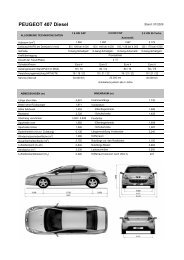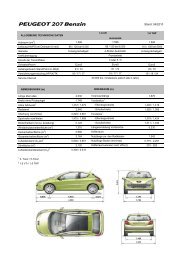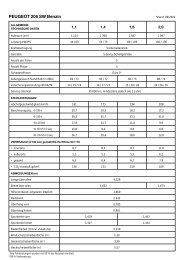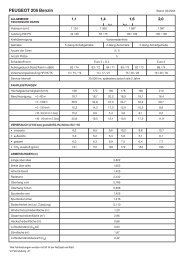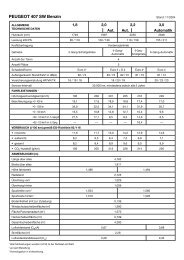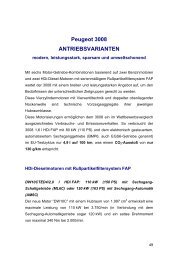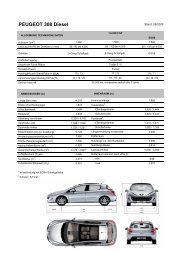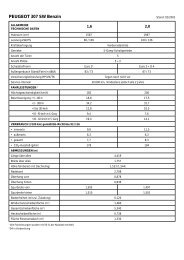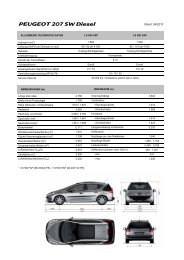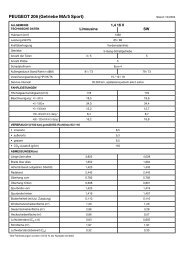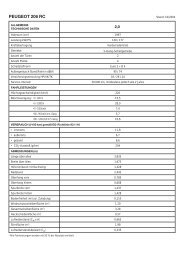PSA COUV page . page RA GB - PEUGEOT Presse
PSA COUV page . page RA GB - PEUGEOT Presse
PSA COUV page . page RA GB - PEUGEOT Presse
Create successful ePaper yourself
Turn your PDF publications into a flip-book with our unique Google optimized e-Paper software.
Certain restructuring measures do not fulfil the more stringent recognition<br />
criteria contained in American accounting standard EITF 94.3.<br />
Write-off of restructuring costs against goodwill<br />
Under French GAAP (CRC 99-02), reserves to cover the cost of<br />
restructuring newly-acquired subsidiaries can be charged against the<br />
related goodwill in some circumstances.<br />
This alternative accounting treatment of restructuring reserves is<br />
specific to France and does not exist in US GAAP.<br />
Development costs to be billed to customers included<br />
in inventory<br />
Certain Automotive Equipment development costs that are to be billed<br />
to customers are included in the cost of inventory.<br />
Under US accounting standard EITF 99-05, effective from 2000, these<br />
types of costs may not be capitalized if certain conditions are not met.<br />
EITF 99-05 did not require prior years’ financial statements to be<br />
restated to take account of this change of method. The effect of the<br />
change of method on the 2000 financial statements was therefore<br />
limited to the restatement of goodwill in the opening balance sheet of<br />
the Sommer Allibert Group.<br />
Goodwill<br />
- Recognition<br />
Under French accounting standards, adjustments to goodwill may be<br />
made up to the end of the fiscal year following the year of acquisition.<br />
Under US GAAP, the maximum period is twelve months.<br />
- Amortization<br />
Under French accounting standards, goodwill is amortized over a<br />
maximum of twenty years and an impairment loss is recognized where<br />
necessary.<br />
Effective from January 1, 2002, goodwill and certain intangible assets<br />
may not be amortized under US GAAP (SFAS 142). SFAS 142 requires<br />
companies to identify reporting units and to test goodwill for<br />
impairment at least annually using a two-step process. The first step is<br />
a screen for potential impairment and the second step measures the<br />
amount of impairment, if any.<br />
At December 31, 2002, the Group screened its principal reporting<br />
units. The screening process did not reveal any potential impairment of<br />
the related goodwill at that date.<br />
Securitization<br />
During the year, the Group sold portfolios of automobile loans through<br />
securitization operations described in note 23. The impact of these<br />
transactions on earnings for the year was not material.<br />
Under US GAAP applicable to transfers of financial assets, the retained<br />
interest must be recorded under assets at fair value. Fair value is<br />
determined based on estimated discounted future cash flows from the<br />
retained interest, taking into account experience-based expected early<br />
repayment and credit loss rates. Early repayment and credit loss<br />
assumptions are based on the least favorable rates observed over the<br />
past four or five years. The discount rate applied includes a risk<br />
premium reflecting the variability of these parameters. The gain on the<br />
sale of the finance receivables takes into account the retained interest<br />
carried in the balance sheet and the original net book value of the assets<br />
and liabilities corresponding to the transferred assets.<br />
Derivative instruments and hedging activities<br />
Under French GAAP, derivative instruments that qualify for hedge<br />
accounting may not be valued by the mark-to-market method.<br />
Statement of Financial Accounting Standards (SFAS) no. 133<br />
“Accounting for Derivative Instruments and Hedging Activities” is<br />
applicable effective from fiscal 2001.<br />
The procedures applied by the Group to manage currency and interest<br />
rate risks are described in note 47.<br />
The effect of applying SFAS 133 on opening stockholders’ equity as of<br />
January 1, 2001 is shown separately from the effects on the accounts<br />
for the years ended December 31, 2001 and 2002.<br />
The €22 million effect on 2002 income includes a €3 million loss<br />
related to the ineffective portion of fair value hedges, and a €25 million<br />
profit corresponding to changes in the fair value of instruments that do<br />
not qualify for hedge accounting under SFAS 133. The total effect on<br />
2001 income was €13 million, including, respectively, a €3 million loss<br />
and a €16 million profit.<br />
Reserve for debenture redemption premiums<br />
Amounts released from this reserve in respect of debentures converted<br />
into common stock during the year are credited to income. Under US<br />
GAAP, the net-of-tax amount should be credited directly to<br />
stockholders’ equity, without impacting the statement of income.<br />
Unrealized gains and losses on marketable securities<br />
Marketable securities are stated at cost and an allowance is booked to<br />
cover any permanent impairment in value.<br />
Under US GAAP, marketable securities for which there is a liquid<br />
market are marked to market and the resulting unrealized gain or loss,<br />
net of tax is posted directly to stockholders’ equity without impacting<br />
the statement of income.<br />
Own shares held in connection with stock option plans<br />
Own shares that are being held for allocation on exercise of employee<br />
stock options are carried at cost under “Short-term investments”.<br />
Under US GAAP these shares are deducted from stockholders’ equity<br />
at cost under “Treasury stock”.<br />
142<br />
<strong>PSA</strong> <strong>PEUGEOT</strong> CITROËN - APPENDICES TO THE MANAGING BOARD REPORT




